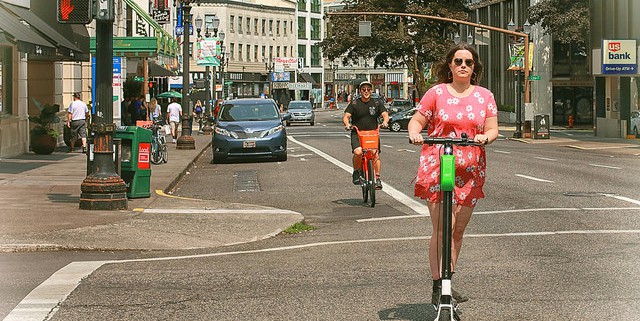California Bike-Sharing in Danger
For Immediate Release 8/5/22
Contract: Jared Sanchez, CalBike, (714) 262-0921, Jared@calbike.org
Unless Fixed, AB 371 Could Kill Bike-Sharing in California
Sacramento, Calif. – The California State Senate is considering a bill that will endanger bike and scooter sharing in California.
The Kill Bike-Share Bill (AB 371) would require providers of shared bikes and scooters (whether a private company or a transit agency) to carry insurance to pay for injuries caused through no fault of their own, including by the rider’s own negligence. It’s unprecedented and will drive up the costs of bike and scooter sharing so severely that many programs will have to be canceled. AB 371 could end hopes of expanding these programs into low-income communities.
CalBike opposes AB 371 unless it is amended to remove the insurance mandate. The bill must leave the Senate Appropriations Committee by August 11th.
“California should drastically expand bike-share, not hobble it with prohibitively expensive requirements,” said Jared Sanchez, senior policy advocate, CalBike. “AB 371 punishes shared scooters and shared bikes, while strangely boosting mopeds masquerading as e-bikes. Reducing active transportation options will cause increased driving and worse pollution in already burdened neighborhoods. This bill will also reduce economic security for low-income people who rely on these low-cost shared mobility options to get to jobs, school, and recreational activities.”
The Kill Bike-Share Bill was amended in June 2022 to reduce the amount of the insurance requirement. However, AB 371 in its current form will still have a devastating impact on equitable mobility in California. The bill demands a type of policy that isn’t available on the insurance market.
AB 371 also mandates bodily injury coverage out of proportion to the potential that low-speed, human-powered and electric vehicles have to cause damage or injury.
The Kill Bike-Share Bill will undermine California policies designed to reduce greenhouse gas emissions by penalizing active transportation. Indeed, many bike-sharing programs funded with state grants will be forced to close if this bill becomes law. California will fall behind other states instead of being a leader in providing low- and no-carbon transportation alternatives.

 Ian Sane
Ian Sane

 StreetsblogLA
StreetsblogLA